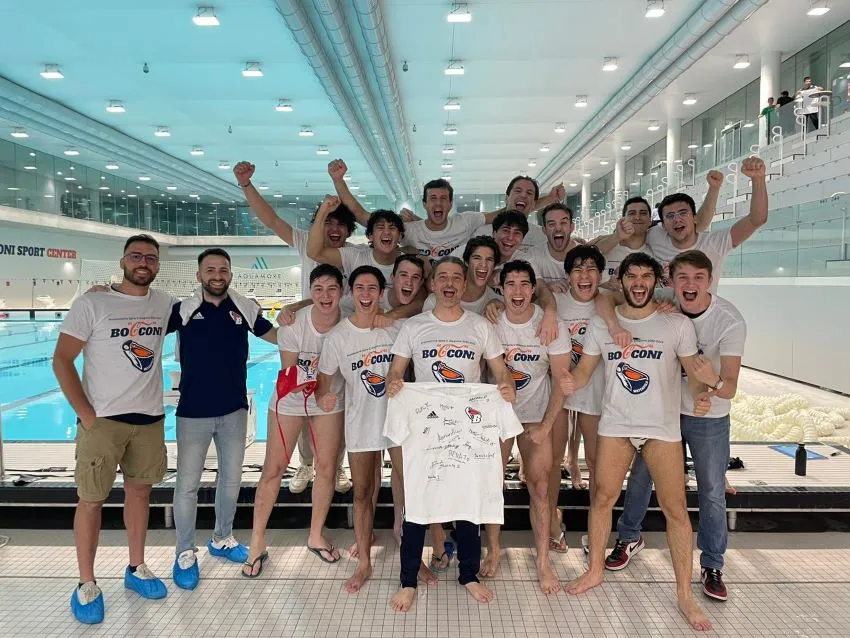
Water Polo, the Pelicans Promoted to Serie C
Those who were present on 12 January remember it as one of the most significant events in Bocconi sports. Packed stands around the pool, national anthems, a loudly engaged crowd and, above all, two teams in the pool that did not spare any effort. The event in question was the water polo match between Bocconi and Harvard, in Italy for a training period. And though, as expected, the win went to the Americans, that day a spark was triggered in the Bocconi team. "We understood that we could achieve great results, that moving up to Serie C was a goal within reach," says Davide Straziota, a member of the team and PhD student in Statistics and Computer Science. The same promotion had also been reached the previous season before it was revoked by federal regulations, which make it mandatory for teams to have a youth sector. "These rules do not take into account our specific situation," explains coach Dario Improda, former player and longtime coach, especially at the youth level in Rome, Novara, Metanopoli and Cremona. "This year we are compliant through an agreement with Canottieri Milano, where we have partnered with one of its youth teams."
The promotion to Serie C is therefore the result of hard work in the pool, but also widespread talent that is rather high for the category: "The first year we had 60 players try out for the team, which allowed us to have a complete and competitive squad of 20 members," continues Dario. "Then the second year another 30 players tried out. Unfortunately, many are foreign students, and high-level athletes, but the federal regulation allows us to play only one international player at a time and this is very limiting. Yet another obstacle for a team with our characteristics." But there are other particularities to a university team, and they constitute its value in a certain sense. "In a normal club team the athletes grow together from the youth to the top team, but here the players arrive with different backgrounds, in different countries, cities and levels," says the coach, "each bringing their own experience. For the coach this makes it difficult, but is also an asset." Adds Davide Straziota, "This forces us to work hard to create a cohesive group in the shortest possible time. But we all play with passion, and this is a fundamental lever, a great help."
Next season, in Serie C, the technical level will be higher. What's next? "We can play a medium-high level championship, considering the current squad. Then it will also depend on any new entries. As I said before, my regret is not being able to deploy all the international players who would like to be part of the team. We have also moved with the league association, CONI, to present our requests." Davide also agrees on the prediction: "We have played several friendlies with Serie C teams, it is a level absolutely within our reach. Qualifying for the promotion playoffs is the goal we want to achieve."
"Moving up to Serie C for our water polo team, along with the prestigious results of other Bocconi teams, testifies to the success of our University's sports model," says Carlo Altomonte, Professor of European Economic Policy and head of the Water Sports section at Bocconi. "Our model is made up of student-only teams, with 'real' students, who have to reconcile studying every day, without concessions, with high-level training. Practices are not easy, but they take place in a context where the infrastructure and services are in line with the best international experiences, provided directly on campus. We believe that our model contributes positively to the human and professional growth of student athletes, because playing sports teaches a lot about life in general."